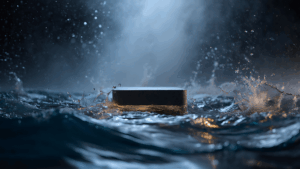Water abstraction refers to the process of extracting water from natural sources such as rivers, streams, canals, springs, underground aquifers, or the sea. The abstracted water is typically transported through distribution systems for treatment and subsequent use in agriculture, industry, or domestic settings.
Understanding the role of water abstraction in modern practices
Water abstraction plays a critical role, allowing for the careful extraction of water from sources like rivers and groundwater for use in agriculture, industry, and domestic purposes. This process is key to managing our limited water resources efficiently. By focusing on essential aspects of the abstraction process, we can mitigate complex environmental challenges and ensure sustainable water use. These operations are critical in providing sustainable solutions for water abstraction impoundment.
The history and origins of water abstraction
Water abstraction is a practice with deep historical roots. For thousands of years, humans have accessed groundwater by constructing wells. Historical records reveal that the Chinese were digging wells as far back as 7,000 years ago. Additionally, one of the oldest known wells, located in Cyprus, is believed to date back to approximately 10,000 BCE.
Ancient wells were constructed by digging shafts deep enough to reach the natural water table. These shafts created reservoirs at the base, ensuring a reliable water supply. Accessing the water typically involved manually lowering and raising buckets. Since these wells were dug manually, they needed to be wide enough to accommodate workers, and their walls were stabilised using materials such as stones, timber, or wickerwork.
Early well water was often distributed to irrigate crops, marking the origins of irrigation. Over time, this practice evolved into the development of more sophisticated systems like canals, dykes, and reservoirs to manage and distribute water.
A fascinating historical feat of well construction is the Woodingdean Well in Brighton, UK. Begun in 1858, it was intended to supply water to a workhouse and nearby school while also providing employment opportunities. Workers dug for two years to reach a depth of over 400 feet but failed to find water. Undeterred, they continued digging for another two years until reaching water at a staggering depth of 1,285 feet—850 feet below sea level—making it the world’s deepest hand-dug well.
Meanwhile, the Ancient Romans pioneered large-scale water abstraction using gravity. By constructing aqueducts, they transported water from mountains and glaciers into cities. This water supported various needs, including drinking, irrigation, and public baths.
Water abstraction regulations
Water abstraction regulations are designed to ensure the sustainable use and management of water resources, protecting both the environment and public interests. In the UK, the Environment Agency oversees these regulations, requiring businesses to apply for licences when abstracting significant volumes of water. These rules help prevent over-abstraction, which can deplete natural sources, harm ecosystems, and impact downstream users. Regulatory frameworks are continuously reviewed to address challenges such as climate change, population growth, and shifts in water demand. Compliance with these regulations is critical for businesses, as breaches can result in fines, licence revocations, or operational restrictions. Staying informed about policy updates is essential for maintaining compliance and supporting long-term water sustainability.
Getting a water abstraction licence in the UK
In the UK, businesses abstracting more than 20 cubic metres of water per day are required to obtain a water abstraction licence from the Environment Agency. These licences are crucial for ensuring sustainable water use and maintaining a balance among all stakeholders.
The Environment Agency issues a business with a water abstraction license for durations ranging from 6 to 18 years, with most renewals extending for 12 years. Licences can hold significant value as business assets and are often included in the sale of properties.
However, climate change is posing significant challenges to the current water abstraction framework. There is growing concern that existing regulations may not adequately address the unpredictability of water availability. To address this, the UK government is exploring reforms to water abstraction policies to ensure they remain effective in an era of increasing environmental uncertainty. Businesses that rely on water abstraction must prioritise water efficiency to align with these reforms and support sustainable practices.



